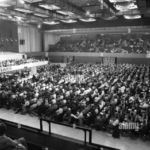The National Trade Union Congress (NTUC) is advocating for stronger labor rights, and you can make a difference too!
Table of Contents
The National Trade Union Congress (NTUC) is a powerful governing body that works to protect and advance the rights of workers in Singapore.
It was formed in 1961 as a voluntary association by trade union leaders, giving voice to labor rights for all workers.
NTUC is dedicated to providing a spectrum of services and benefits for its members, including collective bargaining and dispute-resolution mechanisms.
Why NTCU’s Labor Rights Stand Out
NTUC’s (National Trade Union Congress) labor rights stand out because of its extensive coverage and comprehensive assistance for workers.
Not only does it provide services such as legal aid, job placement, and training programs, but it also actively lobbies for better policies that protect workers’ rights.
One way in which NTUC stands out is through its employment standards department. This department ensures that all employers who sign up with NTUC abide by a set of ethical employment practices, including fair wages and safe working conditions.
Furthermore, the union has established a strong network of workplace representatives who can help resolve disputes between employees and management without resorting to legal action.
NTUC also provides various support systems for workers who have been unfairly dismissed or discriminated against at work.
The organization works closely with lawyers to provide legal advice and representation to affected individuals.
In addition, they offer counseling services to help employees cope with the emotional impact of their experiences.
In short, NTUC’s commitment to promoting labor rights sets it apart from other trade unions around the world.
By providing a range of services and advocating for better policies on behalf of workers everywhere, NTUC has become an essential advocate for those seeking justice in the workplace.
The Need for Stronger Labor Laws
In light of the COVID-19 pandemic, the National Trade Union Congress (NTUC) has been advocating for stronger labor laws in Singapore.
While the government has already implemented measures to protect workers affected by the pandemic, such as the Jobs Support Scheme and mandatory Safe Management Measures, NTUC argues that more comprehensive legislation is necessary to safeguard workers’ rights and ensure fair treatment.
One area of concern is the issue of job security. Many workers in sectors such as retail and tourism have been hit hard by the pandemic, with some losing their jobs or having their hours reduced.
NTUC has called for a minimum notice period and severance pay for retrenched employees, as well as stricter regulations on companies that engage in unfair labor practices.
Another issue is workplace safety. Despite efforts to enforce Safe Management Measures, there have still been cases of workplace outbreaks and worker fatalities. NTUC has urged for greater penalties against employers who fail to provide safe working conditions or flout health and safety regulations.
Overall, stronger labor laws are crucial not only during times of crisis but also in promoting a fairer and more equitable society.
As Singapore continues to navigate through these challenging times, it is important that we prioritize protecting our workers’ rights and welfare.
Ungeared Towards Fair Working Hours
Despite the efforts made by the government and businesses to promote work-life balance, many workers still face challenges when it comes to fair working hours.
This is especially true for those in industries such as retail, hospitality, and healthcare.
One of the main issues with unfair working hours is that it can lead to physical and mental exhaustion among workers.
When employees are overworked, they may experience burnout or stress-related illnesses which can negatively impact their productivity and overall well-being.
In addition, long working hours often mean less time for rest and relaxation, which can affect personal relationships and quality of life.
NTUC has been pushing for greater regulation of working hours through measures such as mandatory rest days and limits on overtime work.
These measures aim to ensure that workers have sufficient time off to recharge mentally and physically while also preventing exploitation by employers who may require excessive amounts of overtime without appropriate compensation or benefits.
Overall, ensuring fair working hours is essential not only for improving worker welfare but also boosting productivity in the long run.
A Look at NTUC’s History of Fighting For Worker Rights
NTUC, founded in 1961, has been a leading organization fighting for worker rights in Singapore.
In the early years of its establishment, NTUC played a vital role in championing the welfare of workers by advocating for better working conditions and higher wages.
Over time, they also took up causes such as job security and employment benefits.
NTUC’s fight for worker rights has not been limited to advocating at the top level; they have also established training programs to help workers develop their skills while ensuring that employers provide safe working environments.
They have also spearheaded initiatives such as FairPrice to make necessities more affordable for low-income households.
Despite the progress made over the years, there is still work to be done in terms of securing fair treatment and protection of labor rights. However, NTUC’s unwavering commitment to fight on behalf of Singaporean workers provides hope that change can be achieved through collective efforts.
Exposing Unfair Employer Practices: The Power of the NTUC
National labor union of Singapore, has been an advocate for workers’ rights and welfare.
The NTUC has played a significant role in exposing unfair employment practices and protecting the interests of workers.
In fact, one of the primary functions of the NTUC is to ensure that employers comply with labor laws and regulations.
Through its network of unions, the NTUC works closely with employers to negotiate better working conditions and wages for employees.
Additionally, it regularly conducts surveys and studies on employment trends to keep up with changes in the job market.
This information helps it develop policies that promote fair employment practices.
The NTUC also provides legal assistance to its members who face discrimination or exploitation at work. It ensures that their grievances are addressed through proper channels and seeks redress where necessary. With its extensive resources and experience in dealing with labor issues, the NTUC is a powerful force in safeguarding workers’ rights in Singapore.
Protecting Workers Through Solidarity: NTUC’s Driver
In an effort to protect workers through solidarity, the National Trade Union Congress (NTUC) has been working hard to safeguard the rights of drivers in Singapore.
This includes tackling issues such as unfair treatment and wage disputes that have been plaguing the industry for years.
Through initiatives like the National Private Hire Vehicles Association (NPHVA), the NTUC has been able to bring together drivers from all over Singapore and provide them with a platform to voice their concerns.
One key issue that the NPHVA has been addressing is driver safety. With concerns over violence against drivers on the rise, it’s important for unions like NTUC to take a proactive approach to protect workers.
By providing support and resources for drivers who have faced violent incidents, as well as advocating for increased safety measures within the industry, NTUC is helping to ensure that all workers feel safe while on the job.
Overall, by promoting solidarity among drivers and taking concrete steps towards ensuring their safety and fair treatment, NTUC is playing an essential role in protecting workers in Singapore’s transportation industry.
As labor rights continue to be a pressing concern globally, organizations like NTUC are vital in fighting for worker protection and highlighting areas where improvements can be made.
Overview: Labor Rights
Labor rights are a crucial part of any society. These rights ensure that workers are treated fairly and with respect.
The National Trade Union Congress recognizes this importance and is dedicated to promoting labor rights for all workers.
This includes advocating for better working conditions, fair wages, and safe working environments.
One of the key areas where labor rights matter is in the fight against discrimination in the workplace.
Discrimination can take many forms including gender-based discrimination, racial discrimination, and ageism.
The National Trade Union Congress works tirelessly to ensure that all workers are treated equally regardless of their background or personal characteristics.
Another area where labor rights matter is in protecting workers from exploitation by employers. This can include situations such as unpaid overtime hours, unsafe working conditions, and being forced to work long hours without breaks or rest periods.
The National Trade Union Congress advocates for laws that protect workers from these types of unfair practices so that they can enjoy a good quality of life both at work and at home.
Impacts: Worker Insecurity
Worker insecurity can have a significant impact on the workforce and society as a whole.
When workers feel uncertain about their jobs, they may experience anxiety, stress, and financial instability.
This can lead to decreased productivity and quality of work, as well as negative effects on mental health.
Moreover, worker insecurity also undermines labor rights. Workers who fear losing their jobs may be less likely to speak out against unfair treatment or unsafe working conditions for fear of retaliation from their employers.
This creates an environment where labor abuses go unreported and unchecked, leading to further exploitation of vulnerable workers.
To combat worker insecurity and protect labor rights, it is essential that governments implement policies that prioritize job security and fair treatment of workers.
Additionally, unions play a crucial role in advocating for workers’ rights and providing support in times of uncertainty. By creating secure working environments that prioritize employee well-being and safety, we can create more sustainable workplaces that benefit both employees and businesses alike.
Impact: Low Wages
Low wages have a significant impact on individuals and society as a whole. For workers, it means not being able to make ends meet, leading to financial instability and stress.
Even with full-time employment, low wages often result in the inability to afford basic necessities such as housing, healthcare, and food. This can lead to workers having to work multiple jobs or rely on government assistance programs just to survive.
Society as a whole also suffers from low wages. Low-wage workers are less likely to spend money on non-essential goods and services, which can negatively affect local businesses and the economy.
Additionally, low-wage workers may be forced into debt or poverty due to their inadequate income levels, which can increase social inequality and exacerbate existing social issues.
The National Trade Union Congress recognizes the importance of fair wages for all workers.
Through advocating for labor rights and collective bargaining agreements that ensure livable wages for employees across various industries, they aim to improve working conditions and alleviate some of the negative impacts of low wages on individuals and society as a whole.
Benefits of Strong Labor Rights
Strong labor rights bring numerous benefits to both employees and employers.
Firstly, they create an environment where workers feel valued and respected, which in turn boosts their morale and motivation.
This leads to increased productivity and job satisfaction, reducing employee turnover rates.
Moreover, strong labor rights ensure that workers are paid fairly for their work, making it easier for them to provide for themselves and their families.
At the same time, employers benefit from strong labor laws by having a stable workforce that is well-trained and well-compensated.
Strong labor laws also help employers avoid legal disputes with their employees by ensuring compliance with minimum wage laws, safety regulations, non-discrimination policies, and other important measures.
Overall, strong labor rights are crucial for creating a fairer society where everyone has the opportunity to succeed.
By protecting workers’ rights through collective bargaining agreements or other means of advocacy such as trade unions or labor organizations like the National Trade Union Congress (NTUC), we can ensure that businesses operate ethically while fostering greater economic stability within our communities.
Challenges to Labor Rights
One of the biggest challenges faced by labor rights activists today is the growing trend toward precarious employment. This refers to jobs that are low-paying, part-time, and offer little or no job security.
Precarious workers are often denied basic benefits such as health insurance and pensions and may be fired without warning or cause.
This type of work has become increasingly common in many industries, from retail to healthcare to education.
Another challenge facing labor rights advocates is the rise of automation and artificial intelligence (AI). As more jobs become automated or outsourced overseas, workers are increasingly being displaced or forced into lower-paying jobs with worse conditions. While some experts argue that AI will ultimately create new jobs and opportunities, it remains unclear how this will impact workers in the short term.
Finally, there is a growing trend toward anti-unionism among employers and policymakers around the world.
Many companies actively resist unionization efforts by their employees, while governments have implemented laws that restrict collective bargaining rights or make it more difficult for unions to organize.
These trends threaten decades of progress in protecting workers’ rights and improving working conditions across various sectors.
What is the purpose of the Trade Union Congress?
The Trade Union Congress (TUC) is a national organization that represents the interests of workers in the UK.
One of its key objectives is to protect and promote employment rights for all workers, regardless of their job or industry.
This includes campaigning for fair pay, safe working conditions, and equal treatment for all.
Another important function of the TUC is to negotiate with employers on behalf of its members.
This involves collective bargaining, where union representatives work with management to agree on things like wages, hours worked, and other terms and conditions of employment.
By negotiating in this way, unions can help ensure that workers get a fair deal from their employers.
Finally, the TUC also provides a range of services to its members, including legal advice and representation in employment disputes. This can be particularly valuable for workers who feel that they have been treated unfairly by their employer or who are facing disciplinary action at work.
Through these services and others like them, the TUC plays an important role in protecting the rights and interests of workers across the UK.
What role do trade unions play in Labour?
Trade unions play a significant role in labor relations. These organizations are formed to represent the collective interests of employees and to ensure that their rights and welfare are protected.
Trade unions negotiate with employers on behalf of workers, advocating for fair wages, benefits, and safe working conditions.
They also help resolve workplace disputes through collective bargaining agreements.
Trade unions also play an essential role in influencing government policies related to labor laws and regulations.
They lobby for reforms that promote the interests of workers, such as strengthening worker protections or improving access to healthcare and retirement benefits.
Moreover, trade unions provide training programs and other resources that enable workers to develop skills necessary for job advancement or career growth.
In summary, trade unions function as crucial intermediaries between employees and employers regarding matters related to employment relations.
Their roles include representing the collective interest of employees in negotiations with management while ensuring their rights are protected against any form of exploitation or discrimination at work.
By doing this, they contribute extensively towards creating better working conditions for workers nationwide.
What is the National Trades union?
The National Trades Union Congress (NTUC) is a national trade union center in Singapore.
It was founded in 1961 by the late Lee Kuan Yew, who served as Singapore’s Prime Minister from 1959 to 1990.
The organization represents the interests of workers in various industries, including manufacturing, construction, transport, and services.
The NTUC has played a key role in improving labor rights and working conditions for workers in Singapore.
It advocates for better wages, benefits, and working hours through collective bargaining agreements with employers.
In addition to representing workers’ interests at the negotiating table, the NTUC also provides employment support services such as training and job placement assistance.
Despite its successes over the years, the NTUC faces ongoing challenges related to the changing nature of work and technological advancements that are disrupting traditional industries.
To address these challenges and ensure that workers continue to be protected and supported in an ever-changing economy, the NTUC is constantly evolving its strategies and programs to stay relevant and effective.
What are the 4 types of unions?
The four types of unions are craft or trade unions, industrial unions, public sector unions, and white-collar unions.
Craft or trade unions represent workers who have a specific skill set or work in a particular industry.
These include electricians, plumbers, and carpenters. Industrial unions represent all workers in an industry regardless of their specific skill set.
Public sector unions represent government employees such as teachers and police officers.
White-collar unions represent professional employees such as lawyers, doctors, and engineers.
Each type of union has its own unique challenges when it comes to organizing and negotiating for better working conditions and wages.
However, they all share the common goal of protecting the rights of workers and ensuring fair treatment in the workplace.
The National Trade Union Congress (NTUC) recognizes the importance of these different types of unions and works to support them through various initiatives such as training programs for union leaders and advocating for policies that benefit workers’ rights.
The NTUC believes that labor rights matter because they are essential to creating a fairer society where everyone has access to basic needs like education, healthcare, housing, and food security while also having decent work with good pay.
What is the role of trade unions in conflict resolution?
Trade unions can play a crucial role in resolving conflicts between workers and management.
As representatives of the workers, trade unions are in a position to negotiate with management on behalf of their members.
Through collective bargaining, trade unions can negotiate for improved working conditions, higher wages, and better benefits for their members.
This can help to reduce the likelihood of conflicts arising in the workplace.
In addition to negotiating with management, trade unions also provide support and representation to individual workers who may be experiencing conflict or discrimination at work.
Trade union representatives are often trained in conflict resolution techniques and can act as mediators between workers and management when disputes arise.
By providing a neutral third party to facilitate discussions, trade unions can help to resolve conflicts before they escalate into more serious issues.
Finally, trade unions also have an important role in advocating for labor rights at the national level.
They can push for legislation that protects workers’ rights, including laws that ensure fair pay, safe working conditions, and non-discrimination policies.
By doing so they contribute towards creating an environment that is conducive to conflict resolution both within individual workplaces as well as on a broader societal level.
What are the benefits of trade unions?
Trade unions are crucial in protecting the rights of workers across various industries.
One primary benefit of trade unions is collective bargaining, which allows workers to negotiate better wages, benefits, and working conditions with their employers.
This negotiation power is typically absent when employees act alone, making it difficult for them to secure favorable working terms.
Another advantage of trade unions is that they can provide legal representation for members facing employment issues such as wrongful termination or discrimination.
Unions also help resolve disputes between employees and their employers through mediation and arbitration processes.
Furthermore, trade unions play a significant role in the political landscape by advocating for policies that benefit workers’ rights and welfare. Through lobbying efforts and political campaigns, unions work towards implementing fair labor laws and regulations that protect workers from exploitation by employers.
Overall, the existence of trade unions helps ensure that workers receive fair treatment in the workplace while promoting social justice within society as a whole.
What are the five roles of trade unions?
Trade unions, also known as labor unions, play a vital role in protecting and advocating for the rights of workers.
They are organizations formed by workers to safeguard their interests in the workplace. Here are five roles of a trade union:
1. Collective bargaining: One of the most critical functions of trade unions is negotiating collective bargaining agreements with employers on behalf of their members.
This process involves reaching an agreement on issues such as wages, benefits, working conditions, and job security.
2. Advocacy: Trade unions advocate for better working conditions and fair treatment of employees. They lobby government officials to pass laws that protect workers’ rights and ensure they receive equal opportunities.
3. Education: Trade unions provide training and education programs to help members develop new skills or improve existing ones. These programs can include seminars on workplace safety, financial management, health care benefits, or other relevant topics.
4. Legal representation: Unions offer legal consultation services to their members who may be experiencing workplace discrimination or unjust termination from their jobs.
5. Strike action: If negotiations fail between employers and unions during collective bargaining discussions, trade unions may stage strikes or protests as a last resort to fight for better pay rates or improved working conditions for its members.
What is the effect of trade unions on the economy?
Trade unions play a vital role in the economy by advocating for workers’ rights and interests.
Through collective bargaining, trade unions negotiate with employers on behalf of their members to secure better wages, benefits, and working conditions.
This leads to higher consumer spending power and increased economic growth.
Additionally, trade unions promote workplace safety standards and training programs which subsequently reduce work-related injuries and illnesses. This results in reduced healthcare costs for individuals and society at large. Trade unions also have a significant impact on political decisions related to labor laws which can have implications on the overall economy.
Overall, the presence of strong trade unions contributes positively to both individual workers as well as the economy as a whole by increasing worker satisfaction, building stronger communities through higher wages, and promoting safer workplaces leading to reduced healthcare costs while ensuring fair policies that benefit all stakeholders including businesses themselves.
What are examples of trade unions?
Trade unions are organizations that represent the interests of workers in various industries.
Some examples of trade unions around the world include the National Education Association (NEA) in the United States, which represents teachers and other educational professionals, and Unite in the UK, which is comprised of more than 1.2 million members across a range of industries.
In addition to these larger organizations, there are also many smaller trade unions that are focused on specific professions or industries. For example, the International Brotherhood of Teamsters represents truck drivers and warehouse workers in North America, while the National Union of Journalists represents journalists and other media professionals across the UK.
Regardless of their size or focus area, trade unions play an important role in advocating for better working conditions and fair treatment for employees across a wide range of industries.
Through collective bargaining agreements with employers and political activism at local and national levels, these organizations help to ensure that workers’ rights are protected and respected throughout their careers.
What is the importance of a trade union and its impact on society?
Trade unions play a crucial role in protecting the rights of workers and improving their working conditions.
They are able to negotiate with employers on behalf of workers to secure better wages, benefits, and working hours.
By doing so, they help to ensure that workers are treated fairly and with dignity.
Additionally, trade unions provide a platform for workers to voice their concerns and grievances collectively, which can lead to positive change in the workplace.
The impact of trade unions on society is also significant. The existence of strong trade unions has been shown to result in lower income inequality, as well as increased political participation among workers.
This can have wider implications for issues such as social justice and democracy.
Trade unions also contribute to economic stability by ensuring that there is less labor turnover, reducing the cost of recruiting and training new employees.
Overall, the importance of trade unions cannot be overstated.
They play a vital role in protecting workers’ rights, improving working conditions, and promoting social justice and democracy while contributing positively towards economic stability.
It is therefore important that we continue to support them as they work towards creating fairer workplaces for all employees.
What are the factors affecting trade unions?
The factors that affect trade unions can be divided into internal and external factors. The internal factors include the effectiveness of leadership, union structure, membership size, and financial stability.
Strong leadership is essential for a union to be effective in advocating for the rights of its members.
The structure of the union should also allow for fair representation of all members and efficient decision-making processes.
External factors that affect trade unions include political climate, economic conditions, and changes in labor laws.
The political climate can impact the support for unions from government officials or society as a whole.
Economic conditions such as recessions or industry shifts can lead to job loss and decreased membership in unions.
Changes in labor laws can also impact the ability of unions to negotiate on behalf of their members.
In addition to these factors, there are also challenges faced by specific industries or professions that may impact their ability to form strong trade unions.
For example, gig workers may have difficulty organizing due to their status as independent contractors rather than employees with traditional workplace protections. Overall, understanding these various factors is important for both leaders within trade unions and policymakers looking to support labor rights movements.
What did trade unions achieve?
Trade unions have played a vital role in the history of labor rights.
They emerged in response to the exploitation and poor working conditions experienced by workers during the Industrial Revolution.
Trade unions were created to fight for better wages, hours, and working conditions for their members.
One of their most significant achievements is the establishment of fair labor standards that protect workers’ rights.
Another achievement of trade unions was their role in improving workplace safety. In many industries, particularly those involving heavy machinery, workers faced significant risks while on the job.
Unions helped push for stronger safety regulations and training programs to reduce accidents and injuries on worksites. As a result, workplace fatalities have decreased substantially over time.
Finally, trade unions have also contributed to social change beyond just work-related issues. They were instrumental in pushing for civil rights legislation that outlawed discrimination based on race or gender in employment practices. Unions also supported environmental causes by demanding stricter regulations on pollution levels and promoting sustainable development practices within companies’ operations.
In sum, trade unions have made remarkable progress toward protecting workers’ rights and improving overall societal well-being through collective bargaining efforts with employers and government agencies alike.
Who started the trade union?
The trade union movement has a long and storied history, with roots stretching back hundreds of years. While there is no one person who can be said to have started the trade union movement, there are certain key figures who played an influential role.
One such figure was Robert Owen, a Welsh textile manufacturer who lived in the late 18th and early 19th centuries.
Owen was a vocal advocate for workers’ rights and believed that better conditions could be achieved through collective bargaining.
He helped to establish the Grand National Consolidated Trades Union in 1834, which sought to unite disparate unions around the country under one banner.
While this effort ultimately failed, it laid the groundwork for future labor movements.
Another important figure in the history of trade unions was William Sylvis, an American labor leader who founded the National Labor Union (NLU) in 1866.
The NLU aimed to bring together workers from across various industries and trades into one organization that could more effectively negotiate with employers.
The NLU would eventually dissolve due to internal conflicts and financial difficulties, but it set an important precedent for future labor organizations like the AFL-CIO.
What are the major goals of labor unions?
The major goals of labor unions are to protect the rights and interests of workers.
They advocate for better working conditions, fair wages, and benefits such as health insurance and retirement plans.
Labor unions also aim to ensure workplace safety by lobbying for stricter safety regulations.
Another important goal of labor unions is to provide a collective voice for workers in negotiations with employers.
This helps to balance the power dynamic between employees and management, ensuring that workers have a say in their working conditions and compensation.
Finally, labor unions strive to promote social justice by advocating for the rights of all workers regardless of race, gender, or ethnicity.
Many labor unions have been instrumental in fighting discrimination and promoting equality in the workplace through collective bargaining agreements that prohibit discrimination based on protected characteristics like sex, age, or disability.
In summary, labor unions serve as a key force in protecting workers’ rights while promoting social justice ideals within society.
What is the name of the first trade union?
The National Trade Union Congress (NTUC) is a national confederation of trade unions in Singapore. It was founded on 1 May 1961 as the sole national trade union center in the country and has since then played a critical role in championing labor rights for workers across various industries.
While NTUC was established relatively recently, it is worth exploring the history of trade unions globally to better understand their significance.
The first documented trade union can be traced back to the late 18th century when skilled workers formed associations known as guilds to protect their interests. However, it wasn’t until 1824 that the first modern trade union – the Combination of the Workers of England – was established by George Loveless in Tolpuddle, England.
The Combination aimed to improve working conditions and wages for agricultural workers.
Unfortunately, this early attempt at collective bargaining met with significant opposition from employers who saw it as a threat to their power and influence.
Nonetheless, subsequent generations of working-class individuals have continued to rally behind unions like NTUC in advocating for better working conditions and fairer treatment from employers.
Conclusion: Empowering Workers
In conclusion, empowering workers is a crucial aspect of ensuring labor rights are upheld.
Without empowering workers, many employees might not have the confidence to report any mistreatment they encounter in the workplace.
The National Trade Union Congress plays an instrumental role in advocating for labor rights and promoting policies that protect workers’ interests. Through its initiatives, it creates a platform for employees to voice their concerns and seek solutions to issues affecting their welfare.
Empowering workers also promotes job satisfaction and enhances productivity. When employees feel valued, they tend to be more engaged in their work, which translates into better performance and improved business outcomes.
Consequently, businesses that prioritize empowering their workforce often enjoy higher profitability and increased competitiveness in the market.









